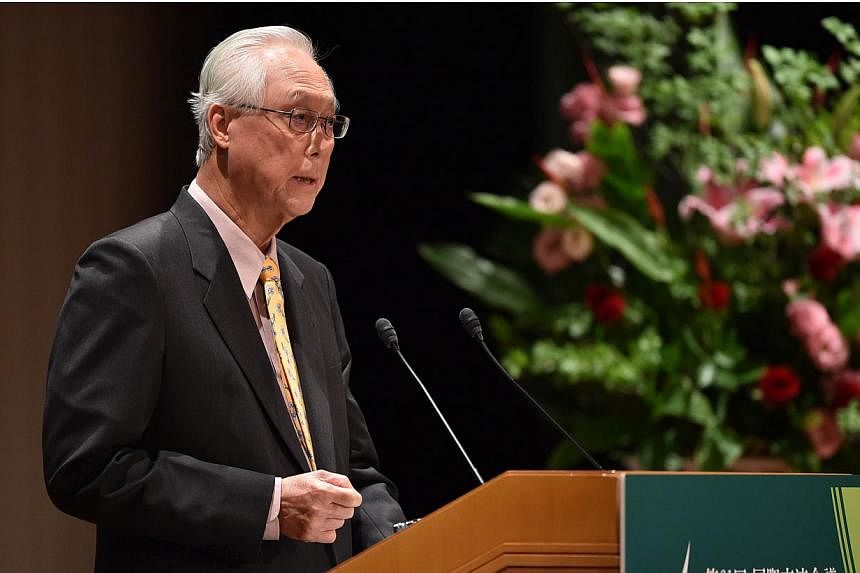SINGAPORE - East Asia has "a historic opportunity" to drive growth but needs to overcome two obstacles, Emeritus Senior Minister Goh Chok Tong said in Tokyo.
He identified these hurdles as the lack of trust and confidence among Asian nations, and the absence of a long-term shared strategic vision for the region.
In a keynote speech at the 21st Nikkei Conference in the Japanese capital on Thursday, he said countries in Asia need to work together towards shared prosperity to fulfil the region's potential.
And the key to this quest is "political will, confidence, trust, vision and the courage to take the initiative".
Mr Goh noted that while it is early days yet to define the 21st century as the Asia Century, there is the opportunity to spur growth.
"East Asia has more people to produce and consume goods and services than any other region. Yet the total Gross Domestic Product (GDP) for East Asia is only around the same level as Europe's. Its GDP per capita - US$8,000 - is less than a third of Europe's (which is) US$27,000," he observed.
"We should aspire to reach Europe's current GDP per capita by 2050. That is in another generation's time. That is the level of prosperity we should seek for East Asia."
But there are two "hurdles" in the way of harnessing Asia's potential.
Mr Goh said the lack of trust and confidence among Asian nations "is deep and historical. It stands in the way of greater cooperation between countries. It also gives rise to heightened nationalism and protectionism".
He recalled how European nations put aside centuries of war and conflict to form the European Union. And despite long-standing French-German enmity, reconciliation between the two was the main driving force behind a peaceful and prosperous united Europe.
Closer to home, he cited how the initial Asean members came together in 1967 because of "strong leaders with a clear unifying vision for the region.
"The Asean countries shifted away from guns and artillery towards mutual accommodation and peaceful negotiation to settle their differences. Where necessary and appropriate, border disputes are resolved through third-party mediation and the rule of law," he said.
Mr Goh added that to build trust and confidence, countries will need to "look squarely" at their history, recognise each other's role and seek reconciliation.
Asia has not satisfactorily resolved the legacy of World War II. Japan's wartime legacy continues to cast a shadow over its ties with its neighbours.
Japanese Prime Minister Shinzo Abe expressed "deep remorse" over Japan's role in World War II in a speech to the US Congress last month. More recently, some scholars of Japanese Studies urged Mr Abe to address Japan's wartime history.
Mr Goh said Prime Minister Abe has pledged to uphold the past apologies of previous governments and has expressed deep remorse and repentance: "He is a strong leader. Only a strong leader can rein in nationalist sentiment and open the way to greater trust with its neighbours."
" It is important to learn from history. But it is just as important to put aside historical issues, and move forward for the common good. Reconciliation requires that contrition goes hand in hand with acceptance. It takes two hands to clap. If one party offers the olive branch, the other party must be willing to accept and move on. Only then can we close the chapter on history."
Mr Goh welcomed ongoing efforts by Japan and China to reconcile their differences and to resolve outstanding bilateral issues.
"The positive atmospherics in the recent meeting between Prime Minister Abe and Chinese President Xi Jinping was a good start," he said.
"Here, both countries can perhaps take a leaf from Prime Minister Modi. He visited China last week. He told reporters after meeting Prime Minister Li Keqiang, 'I stressed the need for China to reconsider the issues that hold us back from realising the full potential of our partnership'. He added, 'I suggested that China should take a strategic and long-term view of our relations'. Of course, China will expect him to do likewise.
"Indeed, Prime Minister Li responded, 'For the true arrival of the Asian century, it must be seen whether China and India … will be able to overcome the difficulties facing us and steadily achieve the goal of modernisation so people can live well'.
"This is not only true for China-India relations but also for the relations among the key East Asian countries today."
Mr Goh said the second hurdle to Asia realising its potential is the lack of a long-term shared strategic vision for region, given that national leaders each tend to pursue his own nation-centric dreams.
Here, he suggested setting up an East Asian Prosperous Community by 2050, to give an impetus towards greater economic cooperation and integration.
It is aimed at mobilising regional resources more efficiently, through a single market and production base.
"It will unleash the massive potential of East Asia and its 2.2 billion people," Mr Goh said.
This vision needs to be anchored by strong values including the rule of law and inclusiveness, to ensure all countries can stand to benefit and that territorial disputes do not derail the progress.
Mr Goh will wrap up his 3-day visit to Tokyo on Friday.
Aside from the two-day conference, he schedule on Thursday included meeting Japanese political leaders including Deputy Prime Minister and Finance Minister Taro Aso, and Liberal Democratic Party Secretary-General Sadakazu Tanigaki.


